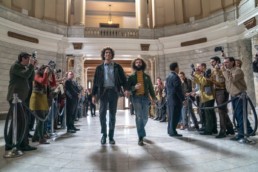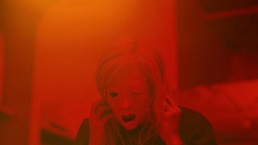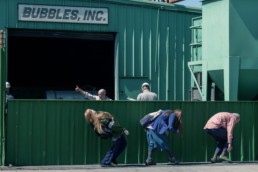Bringing 'I Am Greta' To Life with Non-Binary Singers and Synths
How would you musically describe teenage climate activist Greta Thunberg and her message of ecological urgency? That was the challenge for the Swedish composer-duo Rebekka Karijord and Jon Ekstrand, who took this opportunity to create an unconventionally compelling, hybrid score for the intimate documentary, I Am Greta– streaming on Hulu this Friday.
To create this cinematic score, Karijord and Ekstrand were cautious not to sound too heavy or emotionally leading. Yes, the thought of the world crumbling from the effects of climate change is depressing and horrifying, but the music shouldn't necessarily contribute more somberness. In the end, with a blend of classical instrumentation and electroacoustic elements, the duo struck the right balance.
“With the music for I Am Greta, we aimed to find a sonic counterpoint to the friction between the shy, contemplative inner world of Greta, and the unbounded energy of the natural world and climate change movement... So, we choose to work with repetition and persistent musical patterns, often illustrated through energetic string arpeggios. This, we felt, helped underline the remarkable persistence and focus Greta has on the climate issue, as well as that of the relentlessness of nature.”
Combining a string octet, modular synthesizers, and a voice instrument (built by Rebekka) of 25 male, female, and non-binary singers from around the world in their full range is what brings this soundtrack to life. Listen to the track Tic Toc off of the forthcoming album below:
https://soundcloud.com/whitebearpr/tic-toc-from-i-am-greta-by-rebekka-karijord-jon-ekstrand/s-NN54VGBL4ju
The full soundtrack is available to stream now on the OONA Recordings website and on all streaming platforms, including Spotify.
I Am Greta tells the story of Thunberg through compelling, never-before-seen footage. Starting with her one-person school strike for climate justice outside the Swedish Parliament, Swedish director Nathan Grossman follows Greta - a shy student with Asperger’s - in her rise to prominence, and her galvanizing global impact as she sparks school strikes around the world. The film culminates with her astonishing wind-powered voyage across the Atlantic Ocean to speak at the UN Climate Action Summit in New York City.
In 'The Trial Of The Chicago 7,' Sorkin's Starry Cast Fights Back
In 1968, a mass of counterculture activists spearheaded a massive protest in Chicago’s Grant Park, hoping to draw attention away from the Democratic National Convention and onto their anti-Vietnam War demonstration. To say their plan succeeded, is an understatement.
All eyes were on the "Chicago 7," after the protest sparked a riot between police and protestors, overtaking the city and leading to political unrest (sound familiar?). Charged with criminal conspiracy and crossing state lines to incite a riot, the seven men and the trial that followed became one of the most infamous events in history. And with The Trial Of The Chicago 7 (on Netflix tomorrow), the story comes to audiences by way of Mr. Courtroom Drama himself: Aaron Sorkin.
Acclaimed for his Oscar-winning screenwriting but here directing his second film, Sorkin assembles a top-notch cast of actors, including Eddie Redmayne, Sacha Baron Cohen, Jeremy Strong, Frank Langella, and Joseph Gordon-Levitt, plus short but sweet appearances by Kelvin Harrison Jr, and Michael Keaton, to name a few. To be expected in any Sorkin work, there is a lot going on here: from fast-paced dialogue to quick cuts that jump between archival footage and reenactments, The Trial Of The Chicago 7 is sealed with the stamp of Sorkin. If you love his previous work, I won't have to sell you on this film. I know you'll watch it anyway.
A line that's repeated throughout the film is the protestor's battle cry "The whole world is watching!" That was true in 1969, and it's still true today. Here we are, in 2020, reliving eerily similar scenarios of unlawful police brutality, peaceful demonstrations turned into aggressive brawls, and a legal system than runs on bias (conscious or unconscious).
Sorkin said it himself at Tuesday's drive-in screening I attended at the Rose Bowl: "This film will upset you. Anger you. But above all else, it will inspire you." It's no coincidence that the film's release is just weeks before the most important Presidential election of our lives yet, and if there is one takeaway from The Trial of the Chicago 7, it's this: every voice in our country matters, and has the potential to change the world–even it starts as just seven.
Distributed by Netflix, 'The Trial of the Chicago 7' is streaming on Netflix this Friday, October 16, 2020.
We All Need To Listen to David Attenborough–Our Future Depends On It: 'A Life on Our Planet' Explains
One of my most treasured items of clothing I own is a thin white t-shirt with the name "Sir David Attenborough," in all capital letters, plastered across the chest. I bought it second hand from a sustainable fashion brand, something I think Sir Attenborough would approve of. Not only is this shirt one of the softest tops I've ever worn (and a casual flex for fellow nature film nerds), it is a statement that says I love our planet, I believe in science, and when a worldwide hero and qualified leader tells us we're in trouble, I listen.
His voice his iconic. His message is clear: climate change is ruining our beautiful planet. 94-year-old David Attenborough has dedicated his entire life to studying and protecting the natural world, and he describes many life-changing moments in the Netflix documentary A Life on Our Planet, directed by Alastair Fothergill and Jonathan Hughes. The places he visited as a young twenty-something that were once abundantly filled with luscious jungles, ice-capped mountains, and free-roaming wildlife, has become more skeletal every day. This visibly drastic difference is enough to bring a grown man, and definitely a 30-something film critic, to tears.
If seeing the distress on the faces of the displaced chimpanzees or the horrid conditions of factory-farmed chickens don't convince you to think twice about our role on this planet, then maybe Attenborough's desperate pleas will. "We're not apart of nature, but a part of it," or "We need more than intelligence, we need wisdom." But it's not all doom and gloom; Sir David Attenborough is confident that by following his calls to action, we can slow, stop, and then reverse the damage we're doing to our planet, starting with choosing solar over fossil fuel, reducing farm space to let the natural land grow, and incorporating more plant-based meals into our diets.
Attenborough attests that this film is his witness statement and vision for the future. We are so lucky to have him exist in our lifetime and share his knowledge with us. Increased awareness of climate change and sustainability will hopefully inspire future Attenboroughs, so let's do our part to cultivate an environment for them to thrive and carry on the message of our planet's hero.
Distributed by Netflix, 'David Attenborough: A Life on Our Planet' is now streaming on Netflix.
Because the World Isn't a Scary Enough Place Right Now, 'Possessor' is Here
Set in an alternate reality where hitmen for hire infiltrate the brains of innocent people to enact their violent crimes, Possessor is a sci-fi thriller done right. Director Brandon Cronenberg has no problems filling the very big, and very bloody, shoes of his cult icon father David (The Fly, Dead Ringers) in this visionary indie film. Relying heavily on the phenomenal performances from Andrea Riseborough and Christopher Abbott, Possessor is one film that will be hard to shake. One might even say it'll burrow in your brain like a parasite.
Elite assassin and family woman Tasya Vos (Riseborough) is an unsuspecting killer, but her quiet composure and soft-spoken nature don't fool her boss (Jennifer Jason Leigh). In her latest mission, Tasya is to implant herself into the mind and body Colin Tate (Christopher Abbott), the boyfriend of a high profile businessman's daughter. Tasya is then instructed to kill the businessman John Parse, his daughter Ava, and then commit suicide as Colin. After the killings, she is to detach from Colin's brain and resume her life as Tasya. However, the multiple implants Tasya has undergone throughout the years are starting to tear at her psyche, slowly torturing her own life and jeopardizing her ability to make it out of the mission alive.
For a film that is so dependent on the performances of its lead actors, the expectation for a top-notch cast is exponentially high. Christopher Abbott exceedingly delivers as a conflicted man whose thoughts are at constant battle with an invisible force. Andrea Riseborough's commitment to her role is also commendable, further solidifying my belief that she is among the most underrated actors of today. Both Abbott and Riseborough bring restraint and bold expression to a uniquely shocking script, making Possessor a thrill to watch and an impossible film to forget.
Distributed by NEON, Possessor is now playing at the Vineland Drive-In and other select theaters.
'Dick Johnson Is Dead': Love Greatly, Live For the Moment, Eat the Chocolate Cake
Why do we give our love to another person when we just end up alone in the end? This hypothetical question has stumped lovers, poets, and philosophers for years but I believe it comes down to this one reason: we love because that's the only way to live.
Award-winning documentarian Kirsten Johnson (Cameraperson) shows that loving wholeheartedly may be painful but the reward of being vulnerable and sharing your life with another person far outweighs the eventual heartache of losing them in her most personal film yet, Dick Johnson is Dead. After seeing the mental decline of her aging father, Kirsten suggested making a film about him dying. In her unique way, she works through her emotional hang-ups and the not-so-distant reality of his death by enacting hilariously absurd death scenarios. To execute this, she enlists her 86-years-young, retired psychiatrist father, Dick Johnson, to play himself.
These surreal fantasy moments are sprinkled in throughout an otherwise emotional and at times, heartbreaking, storyline. Dick's memory continues to decline as the film progresses and Kirsten captures it all on camera. The laughter, the tears, the struggles, the chocolate cake. With Dick Johnson is Dead, Kirsten has created a darkly humorous awakening to the reality of death and the impact we all leave behind when we're gone. One of the most powerful moments comes from Dick's "funeral," where a group of his family and friends -who knowingly participated in this mock service- are gathered to reminisce about his impact on their lives. And even though Dick Johnson is alive and well, watching from a peephole behind the door, half of the room is in tears. That's the power of love.
I couldn't help but think about my dad while watching Dick Johnson is Dead. I'm so lucky to have such a close relationship with him and my worst fear is the thought of losing him one day. But I keep coming back to this quote from the film, "What loving demands is that we face the fear of losing each other." Love greatly, without regrets, because we only get one chance.
And at 2:56 pm, as soon as the film ended and I closed out of the Netflix browser, my dad texted me asking when I was going to come over and visit.
Distributed by Netflix, Dick Johnson is Dead is available to stream on Netflix this Friday, October 2, 2020.
'Chasing The Present' Review: A Consciousness Revolution
Quick Take: As Chasing The Present shows, when we finally come to the realization that we have all the answers, our problems don't feel so overwhelming.
I've always considered myself to be a self-questioning person. For better or for worse, I've never been satisfied with the status quo and the expectation of what society considers a "successful life." I studied Buddhism in college after years of fascination over the idea of the minimalist lifestyle, including non-attachment and impermanence. And I'll admit, these ideas sometimes led to nights of unsettling future projecting, but as soon as I was able to reel in my thoughts about tomorrow's unknown, I felt a simultaneous sense of control and relief wash over me. All I can do–all anyone can do–is focus on the present. This very moment. Right Now.
Chasing The Present, the new documentary from Mark Waters, feels like a crash course in the basics of spirituality and consciousness. It's easy to put yourself into the shoes of the main subject, James Sebastiano Jr, who travels the world on a journey of self-inquiry to explore the root cause of his lifelong battle with mental health issues. The gurus, healers, and therapists (including Russell Brand) remind James, and in turn, us, that the only way to end suffering is to break free from attachment. The ego has gotten too comfortable running the show, and when the ego is bruised or starved for attention, we tend to act from a selfish place. Over time, this selfishness leads to unhappiness and emptiness that goes against the only thing (besides food & water) that we as human beings have been biologically conditioned to need: connection. A life lived without a pure connection to oneself and the world isn't a very fulfilling life at all; there's a reason why those on their death beds never regret spending time with loved ones while the career milestones and material wealth end up seeming wholly unimportant.
It's easy to distract ourselves from the awful events happening in the world by turning on the latest reality TV dating show or jumping on any number of social media platforms (highly recommend Netflix's The Social Dilemma to dive deeper into this topic), especially right now. But the only way to get through these tough times is to acknowledge that we have the power to tap into our consciousness and see beyond the hatred and despair and heal ourselves. Beyond anxiety, beyond thought, freedom is possible.
Distributed by 1091 Pictures, Chasing the Present is available to rent on iTunes, Vimeo, and more, today.
'Kajillionaire' Review: A Family of Scammers Long For Connection
I couldn't believe that I was going to miss the world premiere screening of Kajillionaire while I was at Sundance earlier this year. I caught the flu the night before and was physically unable to move, bedridden and devastated to miss this once in a lifetime event. After all, Miranda July is one of my favorite filmmakers and I cursed the cruel irony of skipping the only film that I had really wanted to see at the festival. Fast-forward nine months (and a lot of unexpected life changes later), I finally saw Kajillionaire, and honestly, the timing couldn't have been better.
Writer/Director Miranda July is known for her charmingly original stories about relationships and this one is no different. In Kajillionaire, a family of Los Angeles-based con artists Robert (Richard Jenkins), Theresa (Debra Winger), and their daughter, Old Dolio (Evan Rachel Wood), make a life for themselves by scamming and stealing from a society they claim is phony and foolish. During one desperate "Get Rich Quick" scheme, the family befriends Melanie (Gina Rodriguez), a single woman who doesn't hesitate to help them with their next scam. However, the trust between them gets tested after a couple of shady encounters cause Old Dolio to question her allegiance to her family and the life she thought was predetermined for her.
A good film will always have these three qualities: a strong directorial voice, a clear and coherent script, and a solid cast. Kajillionaire has all of these and then some. Miranda July's deeply felt and visionary style is undeniable with its ethereal, yet down to earth charm. July's tender feelings seep onto the screen, creating a universally emotional bond between the filmmaker and her audience. For as unlikable as their characters' actions are, Richard Jenkins and Debra Winger play Robert and Theresa with a sense of compassion that makes us pity them rather than despise them. Gina Rodriguez gives a complex performance as Melanie, peeling away more layers as the film progresses. But hands down, it's Evan Rachel Wood who steals the show as the totally awkward, extremely guarded Old Dolio, a young woman who ultimately just wants to be loved.
At its core, Kajillionaire is a film about lonely people slowly letting down their guard to accept the gift of human connection. Now more than ever, at a time when human connection is met with a risk warning, this arthouse indie comedy feels like a warm, much-needed hug.
Distributed by Focus Features, Kajillionaire opens in theaters this Friday, September 25.
Obama's White House Photographer Captures What's Different With This Current Presidency, in 'The Way I See It'
Immediately after the film ended, I texted my brother, Ryan. "Just watched The Way I See It for review and wow. Easily one of my favorite films of the year."
It's been claimed that Pete Souza created the best photo archive of a President that's ever been done, and I believe that based solely on the chills I got from watching Dawn Porter's documentary, The Way I See It. The photographer, who is charmingly referred to as The King of Shade on Instagram for his Trump trolling posts, stayed publicly apolitical throughout his entire career as the Official White House Photographer during the Ronald Reagan and Barack Obama presidencies. Like a fly on the wall, he not only documented some of the most influential and powerful moments in American history but humanized the leaders in these roles. Since the Obama era ended, the abuse towards and damage to journalists and the free press by our current President has been completely disheartening. Having reached his breaking point, Pete is finally speaking out against the atrocity of today's leadership through his secret weapon: his photos.
Through his lens, Pete shares intimate moments from Reagan and Obama's terms, the most powerful of which are the small, fleeting moments that have never been seen before. Breathtaking images that are beautiful beyond words portray Obama as more than just the 44th President of the United States, but as your typical dad, husband, and human. The juxtaposition of these personal photos from the Obama era compared to the staged photo-ops of today- since Trump doesn't allow personal photogs access- is a stark reminder that empathy, humility, and communication are the qualities that make a leader honorable.
Perhaps the biggest takeaway is Pete's notion about the role of a leader. Not everyone will agree with your policies, but your behavior should always be respected. This goes without saying that Pete's comments are pointed at one person in particular, but this simple yet common sense reminder applies to everyday situations. A truly remarkable film, The Way I See It is proof that the impact of a still photo can say a lot more than words.
Distributed by Focus Features, 'The Way I See It' is in theaters this Friday, September 18th, and premieres on MSNBC October 9th at 7:00 pm.








